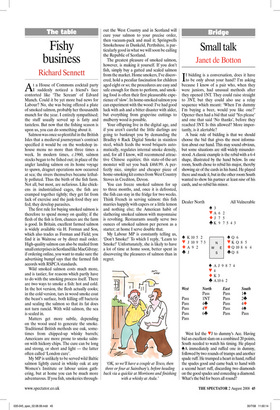Fishy business
Richard Sennett
At a House of Commons cocktail party I suddenly noticed a friend’s face contorted like ‘The Scream’ of Edvard Munch. Could it be yet more bad news for Labour? No, she was being offered a plate of smoked salmon, probably her thousandth munch for the year. I entirely sympathised; the stuff usually served up is fatty and tasteless. But now that the fishing season is upon us, you can do something about it.
Salmon was once so plentiful in the British Isles that a medieval journeyman’s contract specified it would be on the workshop inhouse menu no more than three times a week. In modern times, c.1960, salmon stocks began to be fished out; in place of the angler landing salmon on its home voyage to spawn, dragnet operations now occurred at sea; the rivers themselves became lethally polluted. Thus the birth of the fish farm. Not all, but most, are nefarious. Like chickens in industrialised cages, the fish are cramped together tightly; they get fat from lack of exercise and the junk-food they are fed; they develop parasites.
The first rule for buying smoked salmon is therefore to spend money on quality; if the flesh of the fish is firm, chances are the farm is good. In Britain, excellent farmed salmon is widely available via H. Forman and Son, which also trades as Forman and Field; you find it in Waitrose or by direct mail order. High-quality salmon can also be mailed from small enterprises in Scotland like MacGilvray; if ordering online, you want to make sure the advertising bumpf says that the farmed fish accords with RSPCA standards.
Wild smoked salmon costs much more, and is tastier, for reasons which partly have to do with the smoking process itself. There are two ways to smoke a fish: hot and cold. In the hot version, the flesh actually cooks; in the cold version, tars in wood smoke coat the beast’s surface, both killing off bacteria and sealing the salmon so that its fat does not turn rancid. With wild salmon, the sea is sealed in.
Matters get more subtle, depending on the wood used to generate the smoke. Traditional British methods use oak, sometimes from chipped-up whisky barrels; Americans are more prone to smoke salmon with hickory chips. The cure can be long and strong, or short and light — the latter often called ‘London cure’.
My MP is unlikely to be served wild Baltic salmon lightly cured in whisky oak at any Women’s Institute or labour union gathering, but at home you can be much more adventurous. If you fish, smokeries through out the West Country and in Scotland will cure your salmon to your precise order, then vacuum-pack and mail it; Springwells Smokehouse in Dunkeld, Perthshire, is particularly good in what we will soon be calling the Republic of Scotland.
The greatest pleasure of smoked salmon, however, is making it yourself. If you don’t fish, simply buy a gutted and scaled salmon from the market. Home smokers, I’ve discovered, hold a peculiar fascination for children aged eight or so; the procedures are easy and safe enough for them to perform, and smoking food is often their first pleasurable experience of ‘slow’. In home-smoked salmon you can experiment with the wood: I’ve had good luck with ash and a bitter disaster with alder, but everything from grapevine cuttings to mulberry wood is possible.
Your offspring live in the digital age, and if you aren’t careful the little darlings are going to bankrupt you by demanding the Bradley 6 Rack Digital Smoke in stainless steel, which feeds the wood briquets automatically, regulates internal smoke density, and, for all I know, will recommend attractive Chinese equities; this state-of-the-art monster will set you back £468.99. A perfectly nice, simpler and cheaper piece of home-smoking kit comes from West Country Stoves in Crediton, Devon.
You can freeze smoked salmon for up to three months, and, once it is defrosted, the fish can stay in the fridge for two weeks. Think French in serving salmon: this fish marries happily with capers or a little lemon and nothing else; the American habit of slathering smoked salmon with mayonnaise is revolting. Restaurants usually serve two ounces of smoked salmon per person as a starter; at home I serve double that.
My Labour MP is constantly telling us, ‘Don’t Smoke!’ To which I reply, ‘Learn to Smoke!’ Unfortunately, she is likely to have a lot of time at home soon, better spent in discovering the pleasures of salmon than in regret.


























































 Previous page
Previous page